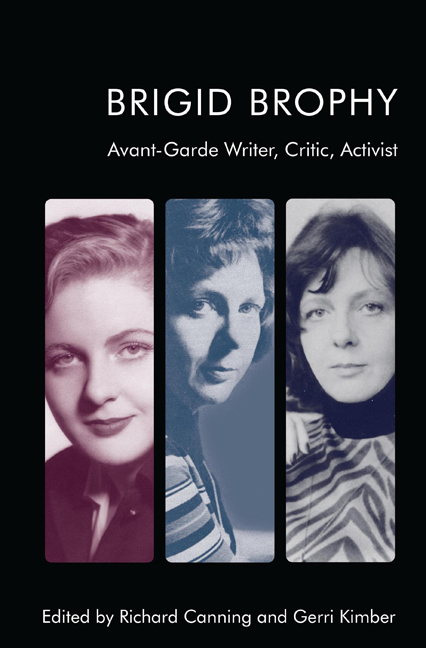Book contents
- Frontmatter
- Contents
- List of Illustrations
- Acknowledgements
- Introduction
- 1 Embodying the Fragments: A Refl ection on the Reluctant Auto-Biography of Brigid Brophy
- 2 Brigid Brophy’s Paradoxical World of Childhood
- 3 Intr oduction to ‘The Librarian and the Novel’
- 4 The Librarian and the Novel: A Writer’s View
- 5 Penetrating (the) Prancing Novelist
- 6 ‘Shavian that she was’
- 7 ‘Il faut que je vive’: Brigid Brophy and Animal Rights
- 8 Brigid Brophy’s Phenomenology of Sex in Flesh and The Snow Ball
- 9 Letter to Brigid
- 10 Encoding Love: Hidden Correspondence in the Fiction of Brigid Brophy and Iris Murdoch
- 11 ‘Heads and Boxes’: A Prop Art Exhibition Collaboration by Brigid Brophy and Maureen Duffy
- 12 Prancing Novelist and Black and White: Experiments in Biography
- 13 ‘Mo nster Cupid’: Brophy, Camp and The Snow Ball
- 14 ‘A Felicitous Day for Fish’
- 15 The Dissenting Feminist
- 16 A Certain Detachment?
- Notes on Contributors
- Index
14 - ‘A Felicitous Day for Fish’
Published online by Cambridge University Press: 17 October 2020
- Frontmatter
- Contents
- List of Illustrations
- Acknowledgements
- Introduction
- 1 Embodying the Fragments: A Refl ection on the Reluctant Auto-Biography of Brigid Brophy
- 2 Brigid Brophy’s Paradoxical World of Childhood
- 3 Intr oduction to ‘The Librarian and the Novel’
- 4 The Librarian and the Novel: A Writer’s View
- 5 Penetrating (the) Prancing Novelist
- 6 ‘Shavian that she was’
- 7 ‘Il faut que je vive’: Brigid Brophy and Animal Rights
- 8 Brigid Brophy’s Phenomenology of Sex in Flesh and The Snow Ball
- 9 Letter to Brigid
- 10 Encoding Love: Hidden Correspondence in the Fiction of Brigid Brophy and Iris Murdoch
- 11 ‘Heads and Boxes’: A Prop Art Exhibition Collaboration by Brigid Brophy and Maureen Duffy
- 12 Prancing Novelist and Black and White: Experiments in Biography
- 13 ‘Mo nster Cupid’: Brophy, Camp and The Snow Ball
- 14 ‘A Felicitous Day for Fish’
- 15 The Dissenting Feminist
- 16 A Certain Detachment?
- Notes on Contributors
- Index
Summary
I was a student in 1973 and worked during the summer in a chicken slaughterhouse. Three years later, I was a vegan campaigning at Compassion in World Farming to end factory farming. I was an evangelising vegan – a vegelical – who was in a hurry to change the world. Today, I am still a vegelical and my life is still dedicated to changing the world. But four decades of campaigning full-time for animal rights demands a price. I now view the world through the prism of cynicism and melancholy, which is why you can follow me on Twitter as the Grumpy Vegan.
In 1977 Compassion's co-founder, Peter Roberts, took me to the RSPCA's ‘Rights of Animals’ symposium at Trinity College, Cambridge. This is when I first saw Brigid Brophy. Every speaker I heard at the symposium was for the first time. I went on to work with some of them, in various capacities and on various projects, including the Labour peer Lord Houghton of Sowerby; the campaigner Clive Hollands; the philosopher Tom Regan; the veterinarian Michael W. Fox; the author Jon Wynne-Tyson; the anti-blood- sports campaigner John Bryant; and the psychologist and campaigner Richard Ryder, whose contribution to animal advocacy is outstanding. The RSPCA symposium was a two-day crash course in philosophy, applied ethics, religious values, campaign strategy and political organising. I left Trinity College inspired with ideas and eager to learn more.
Foremost at the symposium was Lord Houghton's exhortation ‘To Parliament we must go’, which resonated with me as much then nearly forty years ago as it still does today. ‘This is where laws are made’, he said, ‘and where the penalties for disobedience and the measures for enforcement are laid down.’ His wise advice for the animal rights movement to go to Parliament and pass laws for animals is sadly still a challenge for some in the animal rights movement to understand. The single greatest challenge confronting animal rights is making the moral and legal status of animals a mainstream political issue, as animal rights is more than just a moral crusade and an optional personal lifestyle choice. This is something that I explore in my book, Growl, which is an animal rights memoir and manifesto.
- Type
- Chapter
- Information
- Brigid BrophyAvant-Garde Writer, Critic, Activist, pp. 210 - 219Publisher: Edinburgh University PressPrint publication year: 2020



